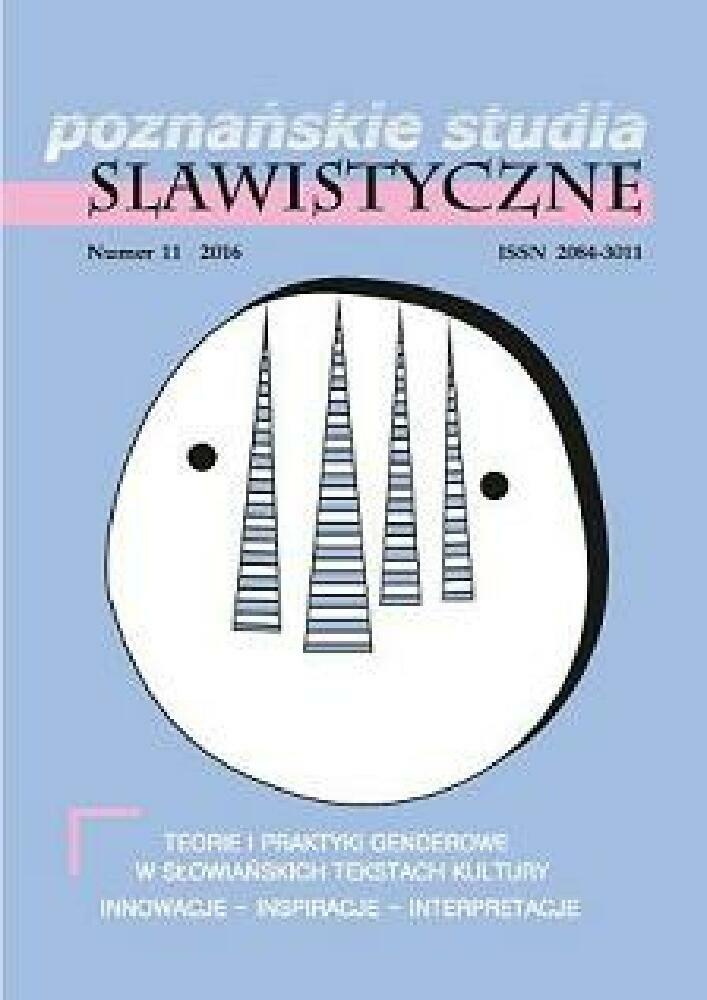Abstract
Foreign literary influences, German and Western European in particular, played a pivotal role in the 19th-century Slovenian literary field. During this time, the first female Slovenian authors emerged. Among them was Pavlina Pajk (1854–1901) who continued the tradition of the sentimental novel. Her texts incorporate several topics and motifs associated with the novels of other Western female authors, in particular those of George Sand. Moreover, Pajk was the first Slovenian woman writer who, presumably influenced by Western ideas, started writing about “the woman question”. This article thus presents Pajk’s ideas concerning “the woman question” in her writings.References
Badalič T., 2014, Reception of European women writers in Slovenian multicultural territory of the 19th century until the end of the first World War, Nova Gorica.
Bogataj-Gradišnik K., 1984, Sentimentalni roman, Ljubljana.
Čeh Steger J., 2014, Idilični prostori kot drugi prostori v pripovedni prozi Pavline Pajk, “Slavia Centralis” no. 1, pp. 73–85.
Juvan M., 2008, Slovenski kulturni sindrom v nacionalni in primerjalni literarni vedi, “Slavistična revija” no. 1, pp. 1–17.
Kos J., 2001, Primerjalna zgodovina slovenske literature, Ljubljana.
Mihurko Poniž K., 2008, Nation and gender in the writings of Slovene women writers: 1848–1918, “Aspasia” no. 2, pp. 28–43.
Mihurko Poniž K., 2011, Women’s emancypation (1897), in: Feminist Writings from Ancient Times to the Modern World: a Global Sourcebook and History, vol. 1, ed. T.K. Wayne, Santa Barbara–Denver–Oxford, pp. 333–336.
Mihurko Poniž K., 2014, Zapisano z njenim peresom: prelomi zgodnjih slovenskih književnic s paradigmo nacionalne literature, Nova Gorica.
Mihurko Poniž K., Badalič T., 2012, French female authors in 19th-century Slovenian territory, in: Les rôles transfrontaliers joués par les femmes dans la construction de l’Europe, ed. G. Leduc, Paris, pp. 77–96.
Ocvirk A., 1975, Teorija primerjalne literarne zgodovine, Ljubljana.
Pajk P., 1876, George Sand, “Zora” no. 17, pp. 275–277.
Pajk P., 1885, Arabela, “Kres” no. 1, pp. 1–9, 65–75, 121–129, 177–186, 225–235, 281–289, 329–338, 385–391, 441–450, 489–496, 545–550.
Pajk P., 1893, Zbrani spisi Pavline Pajkove I, Celje.
Pajk P., 1895, Zbrani spisi Pavline Pajkove II, Celje.
Pajk P., 1896, Dušne borbe, “Ljubljanski zvon” no. 1, pp. 21–26, 86–92, 148–154, 225–229, 282–292, 342–348, 407–412, 475–480, 538–543, 605–612.
Pajk P., 1897, Slučaji usode, Gorica.
Pešak Mikec B., 2003, Pavlina Pajk. Zagovornica ženske emancipacije, in: Splošno žensko društvo: 1901–1945, eds. N. Budna Kodrič, A. Šerše, Ljubljana, pp. 63–72.
Verginella M., 2006, Pajk, Pavlina (born Doljak) (1854–1901), in: A biographical dictionary of women’s movements and feminisms in Central, Eastern, and South Eastern Europe, 19th and 20th centuries, eds. F. de Haan, K. Daskalova, A. Loutfi, Budapest–New York, pp. 389–391.
Vodopivec P., 1994, Kako so ženske na Slovenskem v 19. stoletju stopale v javno življenje, “Zgodovina za vse, vse za zgodovino” I, no. 2, Celje, pp. 30–44.
Wayne T.K. (ed.), 2011, Feminist Writings from Ancient Times to the Modern World: a Global Sourcebook and History, Santa Barbara–Denver–Oxford.
License
Copyright (c) 2016 Tanja Badalič

This work is licensed under a Creative Commons Attribution-NoDerivatives 4.0 International License.
